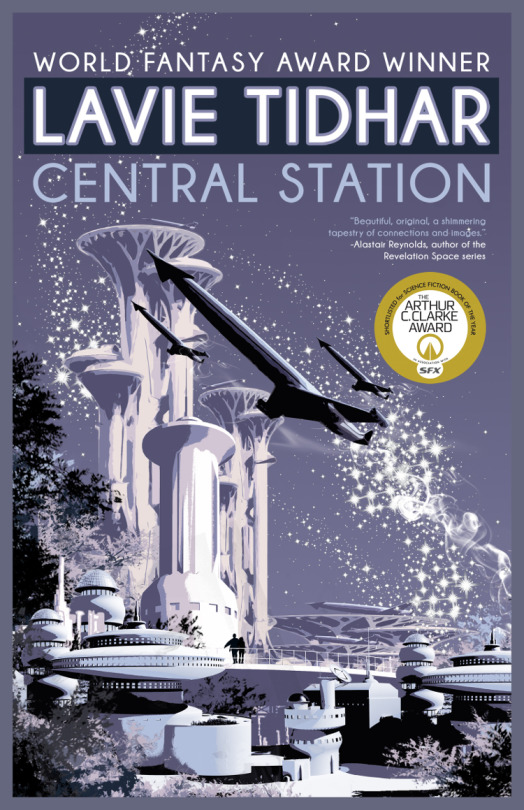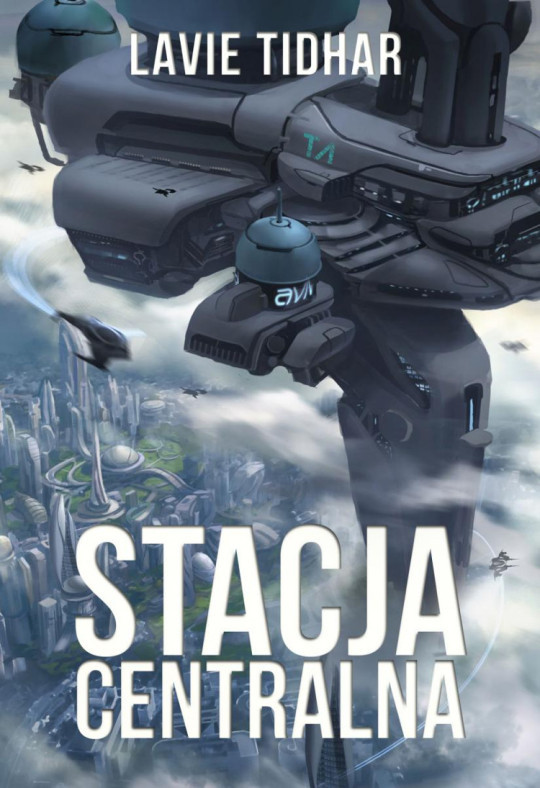Lavie Tidhar’s CENTRAL STATION makes the most familiar science fiction fresh again
Further acclaim for Lavie Tidhar’s John W. Campbell Award winning CENTRAL STATION.

BEST SCIENCE FICTION BOOKS ranks the novel among the ten best books of 2016.
This novel has already won the John W. Campbell Memorial Award, and I’ve heard rumours that the reason it didn’t do better in some other awards was that people weren’t sure whether it was a novel or a collection of stories. To which, all I can say is that if PAVANE by Keith Roberts is a novel, if CITY by Clifford Simak is a novel, if THE MARTIAN CHRONICLES by Ray Bradbury is a novel, then CENTRAL STATION is inescapably a novel also. Yes it is a mosaic of stories, but the stories interconnect, characters recur, a chronological sequence of events leads us directly from the opening story to the last. It’s an account of a future we’ve encountered in a myriad of other science fiction stories (and there are sly references to a host of other works), but this time we’re seeing it from the underneath. This is the future of those left behind by the rocket ships, those trying to hold on to the past, where the chrome is tarnished and the benefits haven’t fully trickled down to the dusty streets. It’s a novel that makes the most familiar science fiction fresh again.
In a separate feature, BEST SCIENCE FICTION BOOKS includes CENTRAL STATION in Year’s Best According to the Awards.
Since no book has stamped its impression on the year by winning all of the awards, we look at who has been shortlisted. As we did last year, we’ve given one point for every book on a shortlist, plus an extra point for winning. We’ve limited our consideration to the most general of the awards, the seven awards listed above plus, this year, the Dragon Award for Best SF Novel, though the winner of this award won’t be announced until the autumn. Again, there are interesting things to note. None of the books shortlisted for the paperback Philip K. Dick Award show up on any of the other shortlists; and there is very little overlap between the Dragon Award shortlist and any others. But that seems to be a feature of the year. One book only, A CLOSE AND COMMON ORBIT by Becky Chambers, shows up on four different shortlists, and it didn’t win any of them (though, of course, it could still go on to win the Dragon Award).
The maximum points possible would be 15 (two points each for winning all of the seven awards above, plus an extra point for being shortlisted for the Dragon Award). The most any book received was four points. And of the 39 books on the list, 24 of them (not far short of two-thirds) received only one point. Which tends to suggest that this year there was no real consensus around what was the best science fiction novel of 2016.
The distribution of points was as follows:
A CLOSE AND COMMON ORBIT by Becky Chambers
DEATH’S END by Cixin Liu
CENTRAL STATION by Lavie Tidhar
THE UNDERGROUND RAILROAD by Colson Whitehead

The Polish site SECRETUM praises the book.
CENTRAL STATION is a charming book that pulls even if it does not fall for the sci-fi. With fascination he reads about the work as a spiritual shepherd of his flock or a conscious elevator that dreams of being a kitchen robot in his next life. Such tastes are abundant here and we catch them every step.
The following chapters show the perspective of another hero, so at first the book reads like a collection of stories. Only moments and characters begin to merge and the reader receives a wider picture of the whole.
Contrary to our expectations we do not get a final finish, but maybe it’s good. Eventually, life is a stream of small events and it does not stop suddenly, just because we turn the last page. It goes on and only in the mind of our imagination is to guess what may still happen. One thing is certain: whether it is on Earth or in space, every creature dreams of love and about loving someone. It does not change even in the science fiction scene.
(Translation from Polish courtesy of Google)

Photo: Kevin Nixon. © Future Publishing 2013
In a fireside chat at NERDS OF A FEATHER, FLOCK TOGETHER, Jonah Sutton-Morse of the Cabbages & Kings podcast enjoys the title.
Recently, I still can’t get Treside McMillam Cotton’s LOWER ED out of my head – top-notch book showing how to create a narrative informed by both data and lived experiences. On the SFF side, Lavie Tidhar’s CENTRAL STATION was excellent (how often do you say that about a fixup novel?), and Ernest Hogan’s HIGH AZTECH (which I picked up based on one of Vajra’s STRANGE HORIZONS columns) was wierd and fascinating Cyberpunk. Plus I’m working on Adam Roberts’ HISTORY OF SCIENCE FICTION, which gives me plenty to think about and argue with.
For more info about CENTRAL STATION, visit the Tachyon page.
Cover by Sarah Anne Langton
